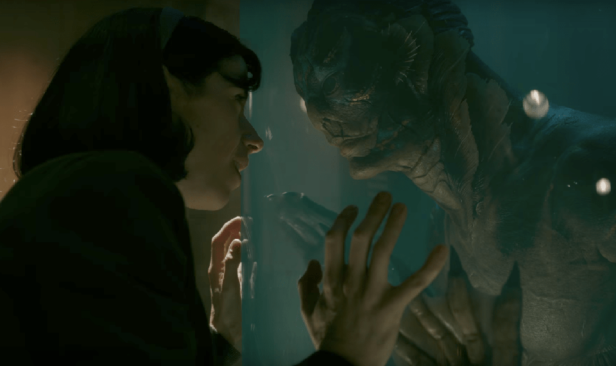Guillermo del Toro loves monsters. That’s always been obvious in his movies – just look at the adoring way he shoots the terrifying kaiju in Pacific Rim, or the way he makes the Pale Man and Faun of Pan’s Labyrinth precisely as beautiful as they are horrible – but The Shape Of Water is his clearest declaration of love yet. Watching it, you’ll find yourself falling in love, too.
Set in early ‘60s Baltimore, The Shape Of Water is equal parts monster movie and romantic fairy tale. Elisa (Sally Hawkins) is an orphan, left incapable of speech by childhood abuse; as a nighttime cleaner at the Occam Aerospace Research Company, she’s routinely ignored by the scientists whose messes she’s paid to mop up. Her invisibility turns out to be a blessing in disguise, though. When she discovers there’s an amphibious creature – who bears more than a passing resemblance to the Creature from the Black Lagoon – being experimented on by the brutal General Strickland (Michael Shannon), she’s able to sneak into the lab unnoticed. And there, over shared packed lunches and meaningful glances, the two of them fall in love.
Creating a convincing romance between a woman and a fishman is probably the film’s biggest challenge, but sensitive performances by both Hawkins and frequent del Toro collaborator Doug Jones (Abe Sapien in Hellboy, the ghost of Edith’s mum in Crimson Peak, and many more) make it not just believable but compelling. Each of them recognises something in the other that draws them irresistibly together.
No-one could accuse del Toro of subtlety: symbolism is everywhere you look in this film, from the artificially bright green candies Strickland constantly chomps on to the red shoes Elisa buys after she and the amphibian man first make love; good and evil are denoted by different colour palettes; and a subplot about Russian spies could hardly be more timely. But there’s nonetheless a delicacy to the way the romance is handled here. Since neither character can declare their feelings to the other out loud, it’s all communicated through look and touch, and yet the things they see in one another – gentleness, kindness, and a shared longing for understanding – are as clear as if they’d spoken the words straight down the camera.
There’s more going on here than a straightforward romance, though. Del Toro weaves the imagery of Hollywood’s golden age into his story, pointing to the power of cinema to tell the stories of the disempowered – and to making the lost feel accepted. It’s not just Elisa and her lover who feels the pain of loneliness, after all; Elisa’s neighbour Giles (Richard Jenkins) is forced into the closet by a society unready to accept his sexuality, while her co-worker Zelda (Octavia Spencer) is beset by racism on all sides. For del Toro, monsters are symbols whose meaning is shaped by the viewer – and for viewers like him who feel different and rejected, monsters can become heroes. Even romantic ones.
It’s a beautiful film on all levels – as gorgeous visually as it is thematically. Every inch of the frame has clearly been carefully considered, and it’s the kind of film you’ll want to watch again and again, to dive back into like a favourite childhood fairytale. Del Toro’s previous film, Crimson Peak, might’ve seemed like a disappointment to cinemagoers lulled by the marketing into expecting a horror film. This time round, he’s taking no chances. The Shape Of Water is unmistakeably a love story – a love letter to both monsters and monster movies, and it’s going to steal your heart.

